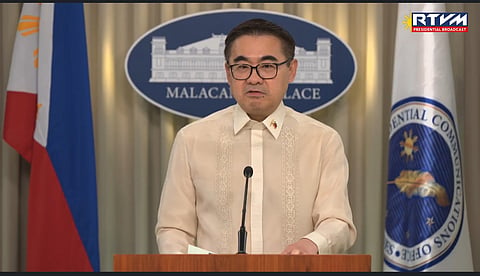
- NEWS
- the EDIT
- COMMENTARY
- BUSINESS
- LIFE
- SHOW
- ACTION
- GLOBAL GOALS
- SNAPS
- DYARYO TIRADA
- MORE

Amid the pronouncement of United States (US) President Donald Trump that he would temporarily pause the imposition of reciprocal tariffs for 90 days on several nations, excluding China, the Philippine government said it would meet with the US Trade Representative (USTR) to negotiate the imposed 17 percent tariffs on US-bound Philippine products.
“We have reached out to the USTR who is responsible for all these trade tariffs. So, we’ve reached out to the USTR and we have communicated with them our desire to engage in a meeting or dialogue with them, and they have positively responded. So I will be scheduling a trip to the US to meet with the USTR soon,” said Special Assistant to the President (SAP) for Investment and Economic Affairs, Secretary Frederick Go, in a Palace briefing on Thursday.
The USTR representative is Jamieson Greer.
The Palace economic team is currently having a meeting to discuss possible ways forward, the next steps, and the possible actions that the government can take regarding these reciprocal tariffs.
Go said four points were raised during the meeting, stating that “the ASEAN Trade Ministers have gotten together and have decided to communicate with the US, I think, three main points – first is to reaffirm the long enduring and strong relationship with the US; second, though, is to express their concern over these unilateral tariffs that are being imposed on the ASEAN; and third is to engage in a frank and constructive dialogue with the US to reaffirm their readiness or our readiness in ASEAN to work together, to explore mutually acceptable solutions on issues of common interest.”
Minimal effects on exports
SAP Go admitted that there is a minimal effect on the country’s gross domestic product (GDP) regarding the 17 percent imposed tariffs; however, he maintained that the Philippines was on the advantageous side, as the country has the second-lowest imposed tariffs among ASEAN peers.
“If you analyze this, the Philippines has a slight advantage. However, we are aware that any tariff, any additional tariffs, still affects certain industries in the Philippines, which is why we think that there’s a slight effect. Based on the NEDA estimates, the possible effect is 0.1% of our GDP in the next two years,” he said.
As a member of the economic team, SAP Go underlined that what the Philippines should do is engage with exporters to discuss with them what possible measures they can take and how the government can assist them in this current situation.
“Secondly, we have to monitor what our neighboring countries are doing, their reactions and requests to the US,” he said.
Go maintained that every country in ASEAN affected by the tariff imposition will continue with their bilateral negotiations with the US and, concurrently, conduct regional discussions with the US.
“And the keywords are cooperation, not retaliation. And of course, lastly, because this is an ASEAN meeting after all, the most important conclusion is as a group to discuss ways to strengthen further and boost intra-ASEAN trade and investment within the region,” the official said.
